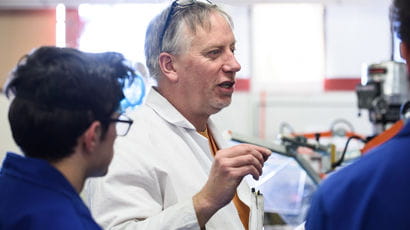Robotic clothing to aid walking a step closer after £11m funding

Clever robotic clothing which keeps people active and independent, addressing the needs of the UK’s 6.7 million people in the UK with age or disability-related mobility issues, has received backing from the UKRI Engineering and Physical Sciences Research Council (EPSRC).
The new VIVO Hub for Enhanced Independent Living will see UWE Bristol partner with University College London (UCL), Imperial College London, the University of Strathclyde and the project’s lead, University of Bristol.
The VIVO Hub will work with the NHS, charities, care providers and industrial partners to develop healthcare technologies to restore the independence of older people and people with disabilities by developing in-home, on-body physical assistance devices to enhance their lives.
VIVO devices include clothing that ‘puts itself on’, smart garments to help prevent falls, and soft exosuits to help people get up from a chair, climb stairs and walk for longer. VIVO power clothing combines AI and digital monitoring technologies with on-body energy storage and power delivery to help people to go to the shops, meet friends and be active in their communities.
Project lead professor Jonathan Rossiter, based in Bristol Robotics Laboratory (BRL) and the University of Bristol’s Faculty of Science and Engineering explained: “Smart robotic clothing has the potential to act as an enabler of movement, activity and independence for people with disability and frailty.
“The VIVO Hub aims to make clothing smarter, stronger, and more capable, helping wearers to be active for longer. Imagine robotic clothing that puts itself on in the morning, helps prevent falls, and detects when the wearer is walking up stairs and automatically gives them a power boost.
“Our ambitious vision is to redefine how we think of clothing. Smart robotic clothing is not just for fashion and warmth, but also provides health monitoring, physical assistance, rehabilitation, helping to restore an active and independent life.”
UWE Bristol’s role within the Hub will be to develop biomechanical testing for the wearable devices in various testing locations, eventually transitioning from controlled testing to clinical studies in collaboration with clinical partners and the NHS to ensure ‘real-world’ applicability.
UWE Bristol lead Carlos Cifuentes, associate professor in Human-Robot Interaction, said: “The VIVO Hub will focus on co-developing and translating technology to improve mobility and independence for older people and individuals with disabilities.
“The team at UWE Bristol will work on the technology integration with all partners and lead the user studies.
“We will enhance the BRL assisted living studio to conduct realistic tests of wearable technologies during daily life activities.”
This will involve incorporating new sensing systems to monitor human performance and usability in controlled conditions, and wearable sensor systems to monitor user biomechanics in long-term studies in natural environments.
According to the Health Foundation REAL Centre, the UK will require 627,000 extra care staff by 2030 to cope with its ageing population.
VIVO is one of five new hubs that will deliver a world-leading research programme focused on advancing and developing novel engineering and physical sciences research.
EPSRC Executive Chair Professor Charlotte Deane added: “The five new hubs bring together a wealth of expertise from across academia, industry and charities to improve population health, transform disease prediction and diagnosis, and accelerate the development of new interventions.
“They represent an exciting range of adventurous techniques and approaches that have great potential to improving the lives of millions of people here in the UK and across the world.”
Related news

01 July 2022
Summit hosted at Bristol Robotics Laboratory explores future direction of assistive technologies
A two-day summit was held at Bristol Robotics Laboratory and UWE Bristol’s Health Tech Hub on the past and future of assistive technologies.

10 January 2021
Bristol Robotics Laboratory supported startup Open Bionics raises 4.6m
A startup developing bionic limbs in the style of superheroes for children and adults has successfully raised £4.6 million.

28 April 2020
Technicians begin manufacture of visors for NHS staff
Technicians at Bristol Robotics Laboratory (BRL) are using laser cutting technology to make protective visors for NHS staff during the coronavirus pandemic.

30 April 2019
Tech entrepreneurs' research to improve Team GB hopeful's prosthetic leg socket
Two young entrepreneurs at UWE Bristol are working on improving the design of prosthetic legs and their sockets in collaboration with an athlete.

22 March 2019
Universities Minister tours enterprise zone and robotics lab on visit to UWE Bristol
Chris Skidmore MP toured Bristol Robotics Laboratory (BRL) and the University Enterprise Zone (UEZ).
You may also be interested in

Media enquiries
Enquiries related to news releases and press and contacts for the media team.

Find an expert
Media contacts are invited to check out the vast range of subjects where UWE Bristol can offer up expert commentary.






